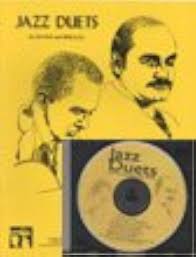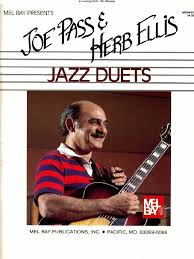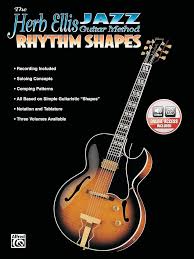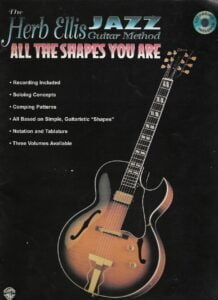Table of Contents
Come join us now, and enjoy playing your beloved music and browse through great scores of every level and styles!
Can’t find the songbook you’re looking for? Please, email us at: sheetmusiclibrarypdf@gmail.com We’d like to help you!

Best Sheet Music download from our Library.






Remembering Herb Ellis, born on this day in 1921 (1921-2010)
Please, subscribe to our Sheet Music Library.
If you are already a subscriber, please, check our NEW SCORES’ page every month for new sheet music. THANK YOU!
Herb Ellis: The Texas Twister Who Shaped Jazz Guitar
Browse in the Library:
Or browse in the categories menus & download the Library Catalog PDF:
Herb Ellis (August 4, 1921 – March 28, 2010) was a masterful American jazz guitarist whose swinging lines, impeccable timing, bluesy feel, and warm tone made him a cornerstone of mainstream jazz guitar for over six decades. Beyond his prowess as a performer, he was also a dedicated and influential educator.
Early Life and Formative Years:
Born in Farmersville, Texas, and raised in the Dallas suburbs, Ellis initially studied piano but switched to banjo and then guitar in his teens. Key early influences were the revolutionary Charlie Christian (for his electric single-note lines) and the gypsy jazz legend Django Reinhardt (for his fiery technique and melodic inventiveness). He attended North Texas State Teachers College (now the University of North Texas), a school now renowned for its jazz program, but left early in 1941 to tour with the Glen Gray and the Casa Loma Orchestra, marking his professional debut.
Rise to Prominence:
- The Soft Winds (1945-1952): Ellis formed a sophisticated guitar-bass-piano trio called The Soft Winds with pianist Lou Carter and bassist Johnny Frigo (later replaced by Bob Carter). This group functioned like a mini big band, known for intricate arrangements and tight harmonies. They composed the jazz standard “Detour Ahead,” which became a signature tune for Ellis and many others.
- The Oscar Peterson Trio (1953-1958): Ellis’s career ascended to international fame when he replaced Barney Kessel in the legendary Oscar Peterson Trio (with bassist Ray Brown). This group, often billed as the “Oscar Peterson Trio + One” due to its piano-guitar-bass format (unusual without drums), became one of the most celebrated and influential small groups in jazz history. Ellis’s role was pivotal:
- Perfect Counterpoint: His fluid, swinging guitar lines provided the ideal rhythmic and harmonic counterbalance to Peterson’s virtuosic piano.
- Rhythmic Drive: His strong, propulsive rhythm guitar playing anchored the trio.
- Melodic Solos: His solos were models of melodic construction, blues inflection, and bebop vocabulary delivered with a smooth, relaxed feel. Albums like At the Stratford Shakespearean Festival and Oscar Peterson at the Concertgebouw capture this magic.
- The “Texas Twister”: His solos could erupt with fast, blues-drenched lines, earning him this affectionate nickname.
Musical Style and Sound:
- The Gibson ES-175: Ellis was almost exclusively associated with the Gibson ES-175 hollowbody electric guitar, often played through a Polytone amplifier, achieving his signature warm, rounded, slightly midrange-focused tone – never harsh, always articulate.
- Swing & Bebop Fusion: His style seamlessly blended the rhythmic drive and phrasing of Swing Era guitarists with the harmonic sophistication and vocabulary of Bebop.
- Deep Blues Roots: Underpinning everything was a profound connection to the blues, evident in his note choices, bends, and expressive vibrato.
- Melodic Focus: He prioritized strong, singable melodies in his improvisations, even at high tempos.
Collaborations Beyond Peterson:
Ellis was a highly sought-after sideman and leader:
- Ella Fitzgerald: He toured extensively and recorded with the “First Lady of Song” during the late 1950s and early 1960s (e.g., the Verve Jazz Masters compilations).
- “The Great Guitars” (1970s-1990s): He co-founded this popular touring and recording group with fellow guitar giants Joe Pass and Barney Kessel (later replaced by Charlie Byrd and others). This project celebrated the history and styles of jazz guitar, featuring intricate interplay and mutual respect.
- Countless Recordings: He recorded with icons like Dizzy Gillespie, Stan Getz, Roy Eldridge, Ben Webster, and many others, appearing on hundreds of albums.
The Educator:
Ellis was passionate about passing on his knowledge:
- Author: He co-authored influential instructional books like The Herb Ellis Jazz Guitar Method and Blues Improvisation for Guitar.
- Clinician: He traveled the world conducting guitar clinics and workshops, known for his patient, encouraging, and practical teaching style.
- University Instructor: He held teaching positions, notably at the University of Southern California (USC).
- Mentorship: He directly influenced generations of guitarists, emphasizing fundamentals like time, tone, phrasing, and melodic development over pure speed or complexity. His focus was on making music with the guitar.
Legacy:
Herb Ellis left an indelible mark:
- A Bridge Between Eras: He connected the swing tradition to modern jazz guitar.
- The Trio Guitarist: Defined the role of the guitarist in the piano trio format alongside giants like Peterson and Brown.
- The Sound: His warm, clear ES-175/Polytone sound remains a benchmark for mainstream jazz guitar tone.
- Blues in Jazz: Demonstrated how deep blues feeling is fundamental to authentic jazz expression.
- Educator: Shaped countless players through his books, clinics, and personal guidance.
- Grammy Recognition: His 1994 album Texas Swings (with Stevie Ray Vaughan guesting) was nominated for a Grammy.
Herb Ellis wasn’t just a technician; he was a profoundly musical guitarist whose playing radiated joy, swing, and deep blues feeling. As both a performer who graced the world’s greatest stages and an educator who generously shared his wisdom, “The Texas Twister” remains a beloved and essential figure in the story of jazz guitar. His music continues to inspire guitarists seeking melodic clarity, rhythmic drive, and that unmistakable warm tone.
Search your favorite sheet music in the category of Jazz, Blues, Soul, & Gospel.
“Georgia (On My Mind)” Herb Ellis & friends
Herb Ellis performs “Georgia (On My Mind),” along with Tal Farlow and Charlie Byrd. From the Vestapol DVD “Great Guitars of Jazz.”
Herb Ellis | Guitar Masterclass
The Great Guitars: Barney Kessel, Charlie Byrd and Herb Ellis • 11-07-1982 • World of Jazz
Three of the all-time greatest jazz guitarists perform their unique skills on the guitar: Barney Kessel, born in Muskogee, Oklahoma, USA on October 17, 1923 was known for his chord-based melodies and was a prolific member of the so-called ‘Wrecking Crew’ group of musicians that accompanied and played on records as diverse as The Mamas & Papas, Sonny & Cher and The Beach Boys.
He was voted the best guitarist in Down Beat Magazine in 1956, 1957 and 1958 and recorded numerous albums. The Gibson Guitar Corporation introduced the Barney Kessel model guitar in 1961 to honor his skills. Barney died on May 6, 2004. Herb Ellis was an American guitarist who probably was best known as a member of Oscar Peterson’s Trio in the 1950s.
He was born on August 4, 1921, as Mitchell Herbert Ellis. He played with Jimmy Dorsey’s band and played on numerous Verve records supporting jazz giants like Ben Webster, Stan Getz, Ella Fitzgerald and Louis Armstrong. Herb died on March 20, 2010. Charlie Byrd was one of America’s greatest guitarists. Born on September 16, 1925, in Suffolk, Virginia, he was strongly influenced by Django Reinhardt’s style and Brazilian bossa nova. He played in Woody Herman’s band in the late 1950s and recorded ‘Jazz Samba’ with Stan Getz. Also, he recorded the famous bossa nova albums with João Gilberto and Antônio Carlos Jobim. Byrd died on December 2, 1999.
The three great guitarists are accompanied by Joe Byrd, Charlie’s brother, on bass and Chuch Redd on drums The repertoire included:
• “It’s the talk of the town” by Marty Symes, Al J. Nieburg, Jerry Livingston; • “Undecided” by Sid Robin, Charlie Shavers; • “A felicidade” by Vinícius de Moraes, Antônio Carlos Jobim; • “Manha de carnaval” by Antonio Mariz, Luis Bonfá; • “Nuages” by Django Reinhardt; • “Goin’ out of my head” by Teddy Randazzo, Bobby Weinstein; • “Flyin’ home” by Sid Robin, Lionel Hampton, Benny Goodman. *”Speak Low” *”Nobody Knows You When You’re Down and Out.” The concert was taped on 17 July 1982 in the Congress Gebouw, The Hague, The Netherlands during the North Sea Jazz Festival.

Herb Ellis Discography (on Wikipedia)
As leader
- Ellis in Wonderland (Norgran, 1956)
- Nothing but the Blues (Verve, 1957)
- Herb Ellis Meets Jimmy Giuffre (Verve, 1959)
- Softly…but with That Feeling (Verve, 1961)
- Three Guitars in Bossa Nova Time (Epic, 1963)
- Together! with Stuff Smith (Epic, 1963)
- 4 to Go! with Andre Previn (Columbia, 1963)
- Guitar/Guitar with Charlie Byrd (Columbia, 1965)
- Man with the Guitar (Dot, 1965)
- Herb Ellis and the All Stars (Epic, 1974)
- Herb Ellis & Ray Brown’s Soft Shoe (Concord Jazz, 1974)
- Seven, Come Eleven with Joe Pass (Concord Jazz, 1974)
- Jazz/Concord with Joe Pass (Concord Jazz, 1974)
- Two for the Road with Joe Pass (Pablo, 1974)
- Rhythm Willie with Freddie Green (Concord Jazz, 1975)
- In Session with Herb Ellis (Guitar Player, 1975)
- After You’ve Gone with Ray Brown, Harry “Sweets” Edison (Concord Jazz, 1975)
- Great Guitars with Charlie Byrd, Barney Kessel (Concord Jazz, 1976)
- A Pair to Draw To with Ross Tompkins (Concord Jazz, 1976)
- Poor Butterfly with Barney Kessel (Concord Jazz, 1977)
- Herb (Sony, 1978)
- Great Guitars: Straight Tracks with Charlie Byrd, Barney Kessel (Concord Jazz, 1978)
- Windflower with Remo Palmier (Concord Jazz, 1978)
- Soft & Mellow (Concord Jazz, 1979)
- Great Guitars at the Winery with Charlie Byrd, Barney Kessel (Concord Jazz, 1980)
- At Montreux Summer 1979 (Concord Jazz, 1980)
- Interplay with Cal Collins Concord Jazz, 1981)
- Great Guitars at Charlie’s Georgetown with Charlie Byrd, Barney Kessel (Concord Jazz, 1983)
- Anniversary in Paris with Marc Hemmeler (Phoenix, 1986)
- Doggin’ Around with Red Mitchell (Concord Jazz, 1989)
- Roll Call (Justice, 1991)
- Memories of You: A Tribute to Benny Goodman with Terry Gibbs, Buddy DeFranco (Contemporary, 1991)
- Texas Swings (Justice, 1992)
- The Jazz Masters with Ray Brown, Serge Ermoll (AIM, 1994)
- The Return of the Great Guitars with Charlie Byrd, Mundell Lowe, Larry Coryell (Concord Jazz, 1996)
- Down-Home (Justice, 1996)
- Herb Ellis Meets T. C. Pfeiler (Tonewheel, 1997)
- Burnin’ (Acoustic Music, 1998)
- An Evening with Herb Ellis (Jazz Focus, 1998)
- Blues Variations (Live at EJ’s, 1998)
- Conversations in Swing Guitar with Duke Robillard (Stony Plain, 1999)
- Great Guitars Live with Charlie Byrd, Barney Kessel (Concord 2001)
- More Conversations in Swing Guitar with Duke Robillard (Stony Plain, 2003)
With Monty Alexander and Ray Brown
- Trio (Concord Jazz, 1981)
- Triple Treat (Concord Jazz, 1982)
- Overseas Special (Concord Jazz, 1984)
- Triple Treat II (Concord Jazz, 1988)
- Triple Treat III (Concord Jazz, 1989)
As a member of the Oscar Peterson Trio
- Oscar Peterson Plays Count Basie (Verve, 1956)
- Oscar Peterson at the Stratford Shakespearean Festival (Verve, 1956)
- Pastel Moods (Verve, 1956)
- Oscar Peterson at the Concertgebouw (Verve, 1957)
- Oscar Peterson at the Stratford Shakespearean Festival (Verve, 1957)
- Soft Sands (Verve, 1957)
- The Modern Jazz Quartet and the Oscar Peterson Trio at the Opera House (Verve, 1957)
- The Oscar Peterson Trio with Sonny Stitt, Roy Eldridge and Jo Jones at Newport (ARS/Verve, 1957)
- On the Town with the Oscar Peterson Trio (Verve, 1958)
- Jazz at the Philharmonic Blues in Chicago 1955 (Verve, 1983) – rec. 1955
- Tenderly (Just a Memory, 2002) – rec. 1958
- Vancouver 1958 (Just a Memory, 2003) – rec. 1958
Reunion with Oscar Peterson
- Hello Herbie (MPS, 1970)
- The Legendary Oscar Peterson Trio Live at the Blue Note (Telarc, 1990)
- A Tribute to Oscar Peterson Live at The Town Hall (Telarc, 1997)
As sideman
With Benny Carter
- Benny Carter Plays Pretty (Norgran, 1954)
- New Jazz Sounds (Norgran, 1954)
With Roy Eldridge
- Rockin’ Chair (Clef, 1953)
- Dale’s Wail (Clef, 1953)
- Little Jazz (Clef, 1954)
With Stan Getz
- Stan Getz and the Oscar Peterson Trio (Verve, 1958)
- Jazz Giants ’58 (Verve, 1958)
With Dizzy Gillespie
- Diz and Getz (Norgran, 1953)
- Roy and Diz with Roy Eldridge (Clef, 1954)
- For Musicians Only (Verve, 1956)
With Vince Guaraldi
- Alma-Ville (Warner Bros.-Seven Arts, 1969)
- It Was a Short Summer, Charlie Brown (Lee Mendelson Film Productions, 1969)
- A Boy Named Charlie Brown: Selections from the Film Soundtrack (Columbia Masterworks, 1970)
- A Boy Named Charlie Brown: Original Motion Picture Soundtrack (Kritzerland, 2017)
With Johnny Hartman
- Unforgettable Songs by Johnny Hartman (ABC, 1966)
- I Love Everybody (ABC, 1967)
With Peggy Lee
- Sugar ‘n’ Spice (Capitol Records, 1962)
- Mink Jazz (Capitol Records, 1963)
- Guitars a là Lee (Capitol Records, 1966)
With Johnny Mathis
- Johnny Mathis (Columbia, 1956)
With Bud Shank
- Bud Shank Plays Music from Today’s Movies (World Pacific, 1967)
- Magical Mystery (World Pacific, 1967)
With Lester Young
- Pres and Sweets with Harry Edison (Norgran, 1955)
- Laughin’ to Keep from Cryin’ (Verve, 1958)
With others
- Mel Brown, Chicken Fat (Impulse!, 1967)
- Priscilla Coolidge, Gypsy Queen (Sussex, 1970)
- Harry Edison, Gee Baby, Ain’t I Good to You (Verve, 1957)
- Victor Feldman, Soviet Jazz Themes (Äva, 1962)
- Johnny Frigo, I Love John Frigo…He Swings (Mercury, 1957)
- The Four Freshmen, The Four Freshmen and Five Guitars (Capitol, 1959)
- Coleman Hawkins, Coleman Hawkins and Confrères (Verve, 1958)
- Illinois Jacquet, Swing’s the Thing (Clef, 1956)
- Randy Newman, Randy Newman (Reprise, 1968)
- Esther Phillips, Confessin’ the Blues (Atlantic, 1976)
- Lou Rawls, Lou Rawls Live! (Capitol, 1966)
- Gábor Szabó, Wind, Sky and Diamonds (Impulse!, 1967)
- Sonny Stitt, Only the Blues (Verve, 1958)
- Mel Tormé, A Day in the Life of Bonnie and Clyde (Liberty, 1968)
- Ben Webster, Soulville (Verve, 1957)
